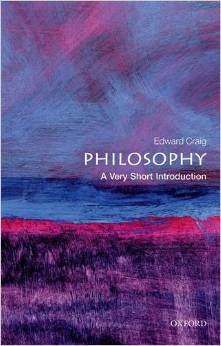I'm searching for a short, lively introduction to philosophy for college freshmen. Edward Craig's volume for Oxford UP's "Very Short" series is lively, but it won't do for my students, and neither would I use it in an American setting.
Craig has a pleasant, mild voice. His low-key approach involves the imprecision of chat but doubtless attracts more readers than an intimidating alternative. "Now let’s look at some more words, all of them ending in 'ism'. This isn't a matter of swotting up vocabulary – rather of finding out more about philosophy as you learn more of the jargon" (61). The first chapter ends with a bracing exhortation to reject laziness in intellectual matters. He sees historical continuity and universal relevance in the basic philosophical problems. The first four chapters introduce ethics, epistemology, and metaphysics by paraphrasing a few classic texts, supplemented with plenty of references to contemporary life. Each of the final four chapters is an interesting grab-bag: "Some themes" addresses ethical consequentialism, moral integrity, political science, rationality, the notion of the self, and the historical context of philosophical ideas. "Of 'isms'" discusses dualism, materialism, idealism, empiricism, rationalism, and skepticism. Craig deserves praise for combating two of the grosser popular mischaracterizations of medieval cosmology (74-5); I can forgive his cheap (and false) shot at C.S. Lewis (91).
But as the author well knows (8), this book is too short. He identifies topics and problems but does little to answer them. It is a prolegomenon, not an introduction. The few answers he gives (vid. every mention of David Hume) are not my answers. As a student of Maritain, I think the book criminally neglects Aristotle and Aquinas, whom the author must mistrust. Despite the exhortation to think through one's opinions and the skeptical judgment of skepticism, the book leaves the impression that truth is not of supreme importance in philosophy. Also inexcusable is the neglect and occasional misrepresentation of Christian philosophical anthropology. (I don't know if the author wrote the glib caption for the fifth image, but I hope not; based on the evidence of Chapter 7 and Caption 18, I suspect he did.) A "Very Short Introduction" to Western philosophy may be impossible, but a long introduction is not. Idiosyncrasy is acceptable in tone, but not in content. Aristotelians must be invited to the discussion.
